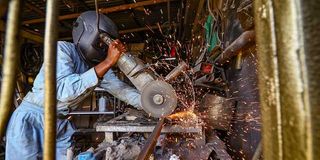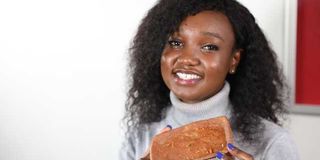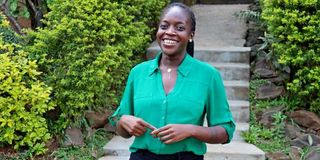How Sheryl, Lorna and Marylyne are demolishing gender barriers in unexpected places

Lorna Nyaloya, 25, works at a welding bay in Utawala, Nairobi.
What you need to know:
- Sheryl Mboya is an advocate and entrepreneur revolutionising sustainability with edible cups while fighting for women’s rights, education, and climate action.
- Lorna Nyaloya Omusula is a trailblazing welder breaking gender barriers, proving women belong in technical trades, and empowering others to join the industry.
- Marylyne Wasal is a climate activist simplifying environmental science, educating children, and advocating for equitable climate finance to protect vulnerable communities.
Women don't just change the conversation—they transform the world.
Meet three extraordinary young women reshaping our future through unwavering determination and bold vision. Sheryl Mboya battles with harmful cultural practices while revolutionising sustainable technology with edible cups. Lorna Nyaloya Omusula wields her welding torch, melting both metal and gender barriers in a traditionally male field. Marylyne Wasal translates complex climate science into actionable knowledge for communities and children.
From innovation hubs to welding bays to classrooms, these changemakers aren't just breaking glass ceilings—they're building entirely new structures of opportunity, sustainability, and justice.
Their stories reveal not just what women can achieve, but how their unique perspectives are essential to solving our most pressing challenges.
Sheryl Mboya
Edible cups and indomitable spirit: Reshaping Africa’s future
From a young girl in Kajiado County, where she saw injustices meted out to children, to a passionate advocate and entrepreneur, Sheryl Mboya is redrafting the book on what it means to be a changemaker.
Her path is a triumph of resilience, passion, and relentless seeking of justice for the marginalised, especially women and children.

Sheryl Mboya.
Even at the tender age of 8, Sheryl was sensitive to the social problem of female genital mutilation (FGM) and child marriages within her community.
“I could not understand why little girls were subjected to operations that robbed them of their childhood and dignity. I knew I had to do something, even as a child,” Sheryl recollects.
This early exposure to institutionalised injustices triggered her interest in advocacy.
She was a member of the Kenya Children Assembly and later the Speaker of the Kajiado Children's Assembly and Cabinet Secretary in the Kenya Children Assembly. Her activism in these roles helped her campaign for the inclusion of intersex children and aid in the Kenya Children Act of 2022.
Sheryl's activism took shape six years ago when she began fighting against climatic and societal injustices.
As a businesswoman, she has founded innovative initiatives such as the Menstrual Hygiene Project, Period! that empowers girls and women by making green menstrual products easily accessible for them and promoting awareness of menarche.
Her work has impacted thousands of lives, bringing dignity and confidence to girls and women. Besides menstrual health, her advocacy extends to education, health, and protection of women and children against exploitation. She says education is the tool for change and she is a vocal supporter of equal education programmes.
Sheryl heads an entity devoted to developing sustainable technologies that counteract global concerns and enable climate action. She attributes her achievements to her parents. Her mother, a civil servant, and her father, an environmental scientist, instilled in her determination and purpose.
Growing up, she was encouraged by her mother to attempt all manner of extracurricular activities, ranging from the study of musical instruments to sports athleticism in such activities as basketball and skating. This exposure across disciplines gave her a versatile creative approach to life that she carries with her to this day. Her interest in climate conservation began in elementary school, where she became interested in environmental issues such as pollution caused by plastics.
Her irritation at disposable plastics prompted her to find alternative sustainable methods, the basis of her entrepreneurial endeavours.
In 2022, she developed edible cups, which became the centre of attention in Stockholm, Sweden, at a time when the world was commemorating the 50th anniversary of the United Nations Conference on Human Environment.
“It bothered me that a simple plastic cup could harm the environment for decades. I wanted to find solutions that wouldn't compromise the planet for future generations,” Sheryl says.
“Snackuit is made using edible products. As such, the end product is edible and can be consumed by all living organisms (human beings, plants, land and marine animals). It is free from allergens, cholesterol and is also sugar-free.”
Sheryl acknowledges the challenges faced by African innovators, including a lack of robust innovation ecosystems and the theft of intellectual property. Such setbacks usually discourage young innovators and they end up abandoning their ideas.
To stem such issues, she advocates the use of intellectual property laws in protecting the work of innovators.
“Our continent is full of brilliant minds, yet countless ideas are lost before they can see the light of day. I would like to empower young innovators to have the tools necessary to protect and grow their creations,” she says.
Through her network and experience, Sheryl guides other young inventors to enhance Africa's innovation ecosystem. Her dream is to see a continent that can produce industrially and dominate the economy using its own great minds.
Being an advocate for children's rights, she has been at the forefront of battling with FGM and child marriages among the nomadic pastoralist communities. Her biggest achievement was when she assisted in reporting, investigating, and prosecuting a child defiler. Her efforts have rescued numerous girls from harmful practices and assisted in law developments, including the Children's Bill 2021.
Her activism also underscores the importance of inspiring young people to dream big. “Feel free to dream as big and wide as you can,” she urges. “But also, work really hard to make those dreams happen.”
Sheryl's life is a proof of the power of creating opportunities rather than waiting for them. In her own words, “if opportunity doesn't knock, build a door.”
Her book is a call to action to the future generation of leaders to rise up, innovate, and battle for a better tomorrow for all.
Lorna Omusula
Daughter of steel: The quest to transform women's place in welding trade
Lorna Nyaloya, 25, is showing staying power and perseverance in a male-dominated field. She wears a light-blue cotton apron and goggles as she moves through the welding bay in Utawala, Nairobi, with the swagger of a seasoned welder.
Lorna is not just welding steel; she is shattering the glass ceiling for women to end gender stereotypes and have their place in technical careers.
“People don’t expect to see a woman behind the welding machine,” Lorna says with a grin, as she lifts her welding mask, her voice almost drowned out by the hum of machinery.
“But I’ve shown that welding isn’t just for men—it’s for anyone with passion and determination.”
Growing up in Nairobi, Lorna drew inspiration from her father, Christopher Waswa, who was a master welder with over 40 years of experience. At a young age, she admired his ability to work with raw metal and create something useful and beautiful out of it.
But like all young girls, her career goals at first leaned towards traditional paths.
“Just like everyone else, I thought I would be working in an office dressed nicely,” she recalls.
But after finishing secondary school at St Anne's Musoli Girls and waiting to enrol at the Co-operative University for a Diploma in Business Management, idleness took her to her father's workshop in 2019.
What started as a hobby, turned into a passion. “I grew to love the scent of metal and the rush of precision,” Lorna states.
Her father guided her into learning the craft of welding, from grinding and cutting to creating finished, quality products.
It was not easy entering the welding world as a woman.
“People would doubt my ability just because I was a female,” she explains.
Initially, the disbelief stung, but Lorna let her work speak for itself.
“Over time, customers came to see that I could do quality work, and they trusted me.”
In fact, her gender has often been a strength in and of itself. Many clients, particularly women, go specifically to her because she's breaking down doors.
“There's something powerful about women empowering women in a place like this,” Lorna says.
Much as she loves her work, it has not been without its costs. One of the initial things she was taught about welding was safety. She recalls how her eyes would hurt when she initially began as she adjusted to wearing protective gear.
Perhaps the most visible change she made was shaving her hair for safety and focus. “It was a practical decision—sparks from the welding machine could easily catch my hair on fire. Plus, I realised I wasn’t that attached to it,” she says with a laugh.
Today, Lorna and her father manage a steady flow of orders, creating everything from shoe racks to gates and tables. In a week, Lorna earns between Sh3,000 and Sh5,000, depending on sales. But her ambitions don’t end there.
“I dream of having my own workshop one day, where I can take on bigger projects, employ other young women welders, and train more women in this field,” she says.
Marylyne Wasal
Planting seeds of change: The battle for climate education
At just 27, Marylyn is shaping a brighter, greener tomorrow in Kisumu County. She describes herself as a climate action champion—a title she has earned through tireless advocacy and innovation.
Her journey into climate activism began after she attended COP26, a transformative experience that ignited her passion for environmental justice.

Marylyne Wasal.
“Living near Lake Victoria, I have seen first-hand the devastating effects of climate change,” she says. “Rising water levels and frequent floods have disrupted livelihoods and left communities in despair.”
Despite a background in communication and public relations, not environmental studies, Marylyn has seamlessly combined her skills to make complex climate issues accessible to the masses.
She credits a mentor for encouraging her to pivot from crafting advertisements to creating impactful climate communication.
“They told me, ‘The world doesn’t just need more ads; it needs people who can translate climate jargon into something everyone can understand.’ That’s when I decided to launch the Loud Voice Podcast,” she shares.
Through her podcast, Marylyn simplifies intricate climate concepts, keeping listeners informed of the latest developments in global climate negotiations.
Yet, her advocacy doesn’t stop at adults. Recognising a gap in environmental education, she founded Toto Green Space to instil environmental stewardship into children and the youth.
“Many schools treat environmental activities as low-priority, and practical engagement is often missing,” she notes.
“I wanted to change the narrative and show children that taking care of the environment is a responsibility, not a punishment.”
She has partnered with four schools in Kisumu County, introducing climate-smart agriculture and gardening through collaboration with Friends of Sango.
The initiative teaches children hands-on techniques, from composting to planting drought-resistant crops. Still, challenges abound, particularly with underfunded public schools and administrators reluctant to participate without incentives.
“Lack of funding and support can be discouraging,” she admits.
“But I’m committed to expanding our reach because I believe early environmental education is the key to lifelong stewardship.”
Marylyne’s work has also placed her at the forefront of national climate processes. She participated in developing Kisumu’s County Climate Action Plan, an experience she describes as a career highlight. She also attended COP29.
“The Sh129 billion annual pledge is a start, but we need to go beyond that. Climate finance must be equitable and accessible for those who need it most,” she asserts.
For her, the growing involvement of youth and women in climate action is promising but insufficient. She emphasises the need for meaningful participation, citing the recent Local Conference of Youth in Mombasa as a step in the right direction.
As a young woman leading the charge, Marylyn encourages others to take action early.
“Start now,” she advises. “Take advantage of every opportunity, no matter how small. Environmental education must be practical and well-funded if we want lasting change.”
Her vision for the future is clear: A generation of children armed with the knowledge and tools to protect the planet. With women like Marylyn at the helm, the future indeed looks brighter.


